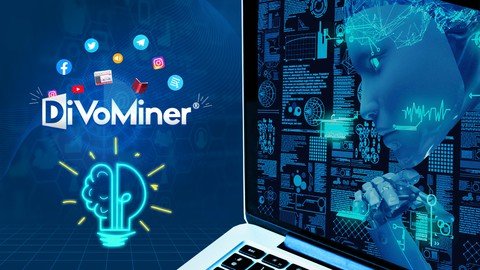
Published 5/2023
MP4 | Video: h264, 1280x720 | Audio: AAC, 44.1 KHz
Language: English | Size: 677.10 MB | Duration: 0h 55m
Learn AI-aided content analysis and the operating procedures in one-stop. Data in, value out.
Free Download What you'll learn
The procedures of doing content analysis
Data sampling
Theme identification and codebook development
Inter-coder reliability test
Machine coding and manual coding on the DiVoMiner® platform
Statistical analysis and data visualization
Requirements
Basic knowledge of how to do a qualitative and quantitative research
Description
Traditional content analysis method (like manual coding) is a lengthy and time-consuming process for researchers in the "big data" context. This course introduces innovative AI-aided content analysis methodology for analysing digital data, empowered by natural language processing (NLP), aiming to help researchers to do social science research faster and more efficiently.The course includes 6 modules:(1) Introduction of content analysis and the operating procedures.(2) The data management: how to upload research data on the platform; how to customize database based on the research purpose; and how to sample data.(3) Data exploration: an initial step to quickly analyse and overview the data. How to present the overall trend of the data in the form of a time series chart, the major themes of the content in the form of a word cloud diagram, and keywords statistics.(4) Theme identification and codebook development: some tips to form coding categories from a large text corpus in an efficient, fast, and comprehensible manner.(5) Machine and manual coding: a data-driven "AI-assisted content analysis" approach is proposed to support researchers on their content analysis in an efficient and effective way, aiming to save 80% of their time on repetitive work like coding.(6) Statistical analysis and data visualization: present analysis results with a variety of visualization tools, such as word cloud, radar charts, scatter graph, heat map and Sankey diagram.
Overview
Section 1: Introduction
Lecture 1 Introduction
Lecture 2 The procedures of content analysis
Lecture 3 Introduction of Some Automated Content Analysis (ACA) Platform
Lecture 4 Data Management on DiVoMiner®
Lecture 5 Data Exploration on DiVoMiner®
Lecture 6 Theme Identification and Codebook Development on DiVoMiner®
Lecture 7 Inter-coder Reliability Test and Coding on DiVoMiner®
Lecture 8 Quality Monitoring on DiVoMiner®
Lecture 9 Statistical Analysis and Data Visualization on DiVoMiner®
Lecture 10 Smart Codebook on DiVoMiner®
Beginner social sciences researchers,Students in Communication and Media,Social media analyst
Homepage
https://www.udemy.com/course/divominer/Links are Interchangeable - Single Extraction
